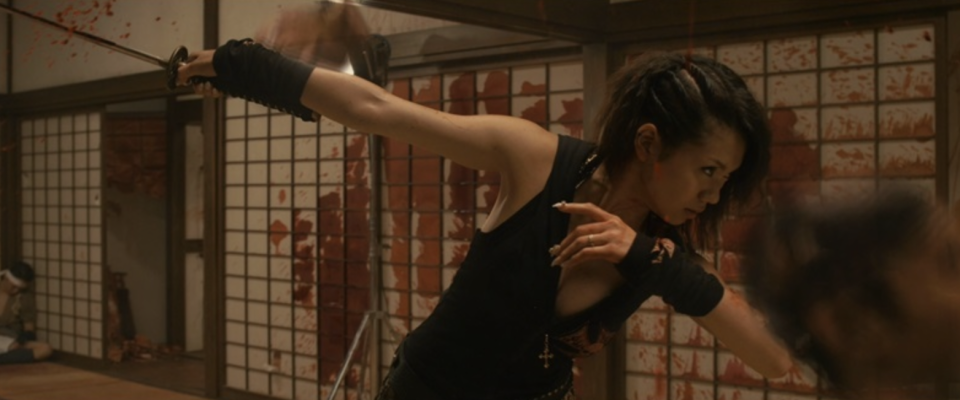‘Why Don’t You Play in Hell?’ Is a Love Letter to Cinema, Dismemberment, and Toothpaste Commercials


On Friday nights, IndieWire After Dark takes a feature-length beat to honor fringe cinema in the streaming age.
First, the spoiler-free pitch for one editor’s midnight movie pick — something weird and wonderful from any age of film that deserves our memorializing.
More from IndieWire
Oscar Nominee Tony Curtis Battles an Evil Boil in Bonkers 'The Manitou'
Long Week? 'The Voices' Is the Rare Midnight Movie Better Enjoyed Alone
Then, the spoiler-filled aftermath as experienced by the unwitting editor attacked by this week’s recommendation.
The Pitch: Is This Gift from the Fuck Bombers the Greatest Movie Ever Made?
One dramatic question plays out twice in Sion Sono’s gleeful, blood-soaked, meta-masterpiece “Why Don’t You Play in Hell?” As a ragtag group of amateur filmmakers known as the Fuck Bombers pursues their earnest quest — to achieve all-time cinematic superiority by capturing the real violence of a yakuza war — every slice of skin and splice of footage demands to know: Is this the greatest movie ever made?
In short, not quite.
As a matter of craft, Sono’s filmography is easily topped by the four-hour triumph that is “Love Exposure.” And even measured against other hypothetical snuff films, the in-universe “Why Don’t You Play in Hell?” probably isn’t taking home any of the Oscars awarded at Cannes (as one character’s absurdly perfect t-shirt implies). But it’s the non-stop surprises, visceral satisfaction, and Sono’s enthusiasm for both film and genre that will make you feel as if the answer should be an emphatic, empirical yes.
This is the kind of movie that puts a smile on your face from minute one, and challenges you to save your praise until after the heads and credits roll. This is the kind of movie you’ll forgive for explicitly and profusely praising 35mm — only to be shot digitally with a grainy film-ish filter and shiny, extra splashes of fake blood added in post. “Why Don’t You Play in Hell?” is the kind of movie that reminds you why people like you and filmmakers like Sono love the movies, even as it quivers under the weight of actually being one of the greats.
Sono cold opens with a zippy toothpaste commercial, as performed by a 10-year-old future yakuza princess Mitsuko (Nanoka Hara/Fumi Nikaidô), who is literally knee-deep in blood by the end of the first act. The jingle is retrofitted to resemble the menacing sting of the “Twisted Nerve” theme in “Kill Bill,” and repeated enough times even viewers who don’t speak Japanese may find themselves trying the lyrics. The Tarantino comparisons don’t stop there, with yakuza boss Muto (actual “Kill Bill” actor Jun Kunimura) and Mitsuko carrying out a revenge plot on behalf of wife/mother Shizue (Tomochika) that’s evocative of The Bride’s decade-plus quest. Not to mention, the Fuck Bombers’ star and would-be “Japanese Bruce Lee” Sasaki (Tak Sakaguchi) sports a yellow tracksuit with black stripes.
But the director character Hirata’s (Hiroki Hasegawa) adorably unhinged film bro purity and Sono’s singular, uncompromising weirdness — what other film inexplicably forces one of its main characters into roller skates for every scene? — elevates “Why Don’t You Play in Hell?” into something far greater than a more authentic “Kill Bill.” Evocative of Sono’s own Super 8-fueled beginnings and packed with nods to midnight movies gone by, this undersung 2013 homage to martial arts masters and grindhouse thrills is transgressive because of its sincerity. Sono delivers as much, if not more, gore and glory, with a fraction of a fraction of Tarantino’s budget and a twist ending that puts even “Once Upon a Time in Hollywood…” to shame. A better comparison might be Shin’ichirō Ueda’s similarly meta “One Cut of the Dead”: a perfect choice if you’re looking for a dismemberment-heavy double feature fit for the film gods. —AF

The Aftermath: Reality Is Going to Lose
When you watch a midnight movie, the sun never has to rise if you don’t want it to. There’s already far too much conventional Hollywood fare that ends with its hero getting over their delusions and adapting to reality. But after dark, you can skip the growth altogether and take premises built on insanity to their logical conclusions.
“We’re in reality and they’re in the fantastical,” rival yakuza boss Ikegami (Tsutsumi Shinichi) remarks when he realizes Muto and Hirata are filming their choreographed attacks on him. “Reality is going to lose.”
Even in the context of a fantasy sequence, his realization that his soldiers are ill-prepared to fight in a movie that they never received scripts for is a wise one. But it’s also a distillation of the “holy shit movies rule!” ethos that powers so much of “Why Don’t You Play in Hell?”
Anyone who loves cinema enough to seek out oddities like this film (or this column, for that matter) can relate to the Fuck Bombers’ idealistic insistence that great movies are the things that can save us. But while a tamer film might show the cruel outside world bending Hirata’s positive outlook towards reality, Sono makes the much more entertaining choice of bending reality to his worldview.
The brilliance of this movie lies in its comically sincere commitment to the idea that making good movies is a vital step in the fight between good and evil. Gaffers and boom operators are choreographed with all the intricacy of martial artists. Sworn yakuza enemies pause their acts of brutality to adjust the lighting. And we never question the logic of risking life and limb for the sake of getting the take. We all have to die somehow — and you could do a lot worse than getting beheaded while giving a peace sign to your arch nemesis as he hypes up your daughter’s martial arts skills.
Sure, the climax sequence produces more severed limbs than a sawmill that just launched a summer internship program — but it never seems gratuitous because we’re ready to follow the Fuck Bombers through the gates of Hell. While I can’t legally recommend that our young readers go sprinting into a line of chainsaws in pursuit of the perfect shot, “death by practical effects” is a fitting end for these glorified comic book characters who pledged their loyalty to the cause of action cinema. When you believe in something that’s this awesome, who needs reality? —CZ
Those brave enough to join in on the fun can stream “Why Don’t You Play in Hell?” on Peacock.
IndieWire After Dark publishes midnight movie recommendations at 11:59pm ET every Friday. Or, you know, at least until someone gets sucked into a wormhole or something. Check out last week’s pick, Clint Eastwood’s ‘Any Which Way You Can’ here.
Best of IndieWire
Unsimulated Sex Scenes in Film: 'Nymphomaniac,' 'The Brown Bunny,' 'Little Ashes,' and More
Every Palme d'Or Winner from the Cannes Film Festival, Ranked
The 13 Best Thrillers Streaming on Netflix in May, from 'Fair Play' to 'Emily the Criminal'
Sign up for Indiewire's Newsletter. For the latest news, follow us on Facebook, Twitter, and Instagram.

 Yahoo News
Yahoo News 
